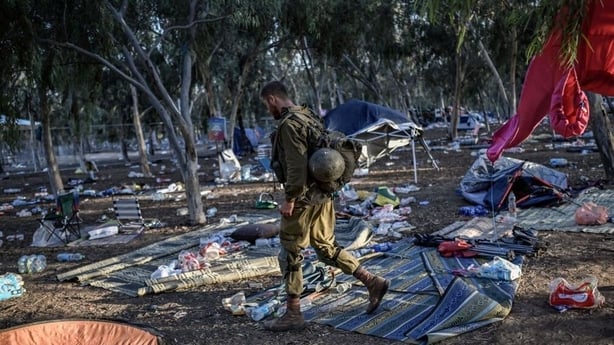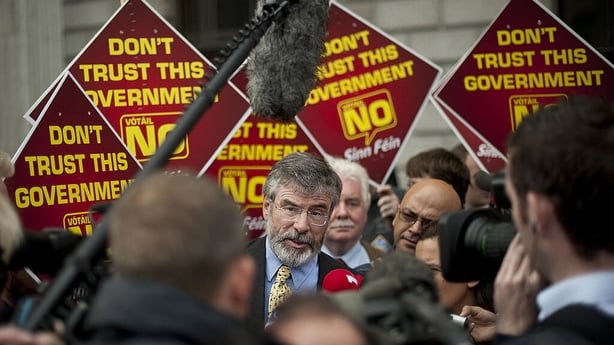In June 2020, as the country prepared to emerge from lockdown, an online event hosted by Sinn Féin attracted a sizeable audience.
Voices from Palestine included a number of speakers, all calling on the Irish Government to "recognise the State of Palestine, sanction the apartheid State of Israel; oppose the annexation and enact the Occupied Territories Bill".
Joining via video link from Gaza, where he spoke under darkness because of an electricity blackout, was Dr Basem Naim, head of international relations for Hamas.
He told the more than 7,000 people tuned in online, according to Sinn Féin's international bulletin newsletter, that efforts by Israel to pursue further annexation of Palestinian land would provoke "a new round of violence".
Any Palestinian who saw "his land, his olive trees being stolen" would "defend himself by all means" and using "any tools – any tools – to resist these plans," he warned. "You cannot expect any quietness," he added.
There was little quietness this week as Israeli airstrikes hammered Gaza in revenge for Hamas attacks last weekend including one at the Supernova music festival which resulted in the deaths of at least 260 people. Kim Damti, a 22-year-old Irish-Israeli woman, was among those who were killed.
On Tuesday, the same Dr Naim appeared on Sky News claiming that that those killed in the Hamas attack were not civilians but soldiers.
"We didn’t kill any civilians," he insisted, adding that saying otherwise amounted to Israeli propaganda.
The previous day, Sinn Féin leader Mary Lou McDonald, who just three years ago introduced the event at which Dr Naim spoke, was on RTÉ’s News at One describing the Hamas attack as "truly horrific" and condemning outright the targeting of civilians and the taking of hostages.
We need your consent to load this rte-player contentWe use rte-player to manage extra content that can set cookies on your device and collect data about your activity. Please review their details and accept them to load the content.Manage Preferences
"Looking at the scenes where a lot of young people were out, enjoying themselves and, to me it was such a violent and traumatic death, it is just truly horrific, and I understand perfectly the sense of trauma that’s been expressed," she said.
"The targeting of civilians and the taking of hostages is to be condemned outright," she said, while also condemning the ongoing bombardment of Gaza by the Israeli forces.
The Sinn Féin leader’s comments marked a hardening of the position taken just days earlier when the party’s Spokesperson for Foreign Affairs Matt Carthy stopped short of explicitly condemning the Hamas attack, saying that both the attacks by Hamas against Israeli civilians and the Israeli bombardment of Gaza must stop immediately.
Her comments were also the most critical her party has made to date on Hamas, raising questions around whether this is another example of the party moderating a position in preparation for government.
In the Dáil on Wednesday, Ms McDonald's comments were more closely aligned to those of the Taoiseach Leo Varadkar than those of TDs on the left.
Ms McDonald praised the Government for its commitment to continuing aid to the Palestinian people.
To Sinn Féin, its statements in recent days do not mark a change in policy, rather an appropriate empathetic response to the manner in which human beings were treated.
In turn, Mr Varadkar held her up as an example as he repeatedly invited Richard Boyd Barrett to "condemn Hamas – it’s not that hard".
Ms McDonald’s outright condemnation of Hamas also put her at odds with many of her party’s representatives, not least her predecessor Gerry Adams, who tweeted: "All those who are decrying today’s terrible events in the Middle East, including the Irish Government, should organise an international intervention to establish a proper negotiating process."
Dublin Bay South TD Chris Andrews defended Hamas in a series of tweets, saying: "It seems that according to the EU and Ireland, only Palestine has no right to defend itself against murder, torture and apartheid."
While Irish foreign policy has long expressed support for Palestinian statehood, Sinn Féin has always gone further than what was articulated by successive Irish governments.
It attacked the decision, made at EU level, to suspend funding to the Palestinian Authority after Hamas’ victory in the 2006 election.
As recently as last summer, Ms McDonald cited "challenging the apartheid regime" in Israel as one of her top three priorities in foreign policy if she gets into government.
Referring to "the Irish experience of colonisation and partition and conflict" she said: "Irish foreign policy has to be true to that tradition, not in a passive way, in a very active way."
To Sinn Féin, its statements in recent days do not mark a change in policy, rather an appropriate empathetic response to the manner in which human beings were treated.
Asked whether the party had changed its position on Palestine, a Sinn Féin spokesperson said: "Absolutely not."

He said: "Sinn Féin will always condemn something that is completely unacceptable, and what Hamas did is completely horrendous and has unleashed something even worse."
However, he added: "It does not represent a change in our position towards Palestine at all."
Professor of Politics at DCU Donnacha Ó Beacháin believes Sinn Féin has had to "refine" some aspects of its foreign policy as the prospect of government becomes more likely.
However, he said this is nothing different to the "natural evolution" that other political parties have gone through in the past.
Prof Ó Beacháin said: "Sinn Féin could argue that when the facts change, they change," he said, adding that the evolution of its attitude to Russia has been much more apparent than any change in its position on the Middle East.
Often accused of equivocating over Vladimir Putin’s regime, Sinn Féin MEPs had abstained or voted against resolutions arguing for sanctions against Russia.
But that all changed with the invasion of Ukraine when the party deleted thousands of statements from its website saying they were "out of date".
A slower evolution happened with its attitude to the EU. It opposed Ireland’s membership of the EU in 1973 and campaigned against a number of EU Treaty reforms including Nice, Maastricht and Lisbon.
Following its opposition to Brexit and any deal that would threaten to reimpose a hard border between North and South, the party’s position towards the EU has softened considerably.
The Irish electorate tends not to vote on foreign policy issues, but a perceived weaknesses in the area could be used as a stick to beat a party with.
In recent days, Fianna Fáil has raised questions about Sinn Féin’s interactions with Hamas.
Senator Timmy Dooley this week called on the party to reveal "the number of times it has platformed Hamas at meetings – online and in person" and "the number of meetings it has held with the terrorist organisation".

Sinn Féin previously left itself open to accusations of being unfit for office after the attendance of some of its representatives to the inauguration of Nicolas Maduro as president of Venezuela in 2019.
But Prof Ó Beacháin said the party has more recently had to "adapt and refine their approach to one that would not lose them votes".
He said: "Foreign policies can be seen as a weakness, and Sinn Féin are alive to that. And that is why they would have refined it to align with what is happening."
There have also been questions around whether some of its international associations would be of concern to EU partners if it finds itself in government in Dublin after the next election.
However, Prof Ó Beacháin said there are now more diverse views across the EU, particularly in response to the latest conflict and to that extent Sinn Féin is "no longer much of an outlier".
In the European Parliament, Sinn Féin is part of the Nordic Green Left Alliance, which also includes Mick Wallace and Clare Daly.
It may seek to change group after the European elections next year.
Following a vote that is likely to see more moves to the extreme left and extreme right, Sinn Féin could find itself appearing centrist in comparison.
"What might seem like an outlier policy in Ireland, is within the realm of what the EU can cope with," Prof Ó Beacháin said.
Sinn Féin has made different journeys on foreign policy before and it remains to be seen to what extent it will evolve in its response to the Israel-Hamas war.
Either way, as it edges increasingly close to government, Sinn Féin's world view will come into sharper focus.






